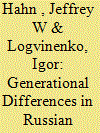| Srl | Item |
| 1 |
ID:
114575


|
|
|
|
|
| Publication |
2012.
|
| Summary/Abstract |
Dagong ?? as a way of life gives rise to many abuses and rights violations against China's 200 million migrant workers. This article analyses the intricate issues of rights deprivation, rights consciousness and personal strategies of Chinese migrant workers with the research findings from a large sample survey completed at the end of 2005. The data confirm the occurrence of many types of rights abuses, significant levels of rights consciousness, and preference for legal and institutionalized means for rights defence besides the use of private resources. Furthermore, the findings reveal that the experience of discrimination, consciousness of rights and choice of personal strategies are affected by personal backgrounds like age, gender, education and occupational status before migration, which carry implications for policy. Finally, the article comments on the ongoing debate about "rights consciousness" versus "rules consciousness" in contentious Chinese politics.
|
|
|
|
|
|
|
|
|
|
|
|
|
|
|
|
| 2 |
ID:
084443


|
|
|
|
|
| Publication |
2008.
|
| Summary/Abstract |
The purpose of this article is to explore whether there is evidence of generational differences in Russian attitudes towards democracy. Are the attitudes, values and beliefs of those who came of age politically after the fall of the Soviet Union significantly different from those who did so in the Soviet period? The main finding is that the post-Soviet generation of Russians is generally more supportive of democratic values and institutions and a free market economy than the generations which came of age politically during the Soviet years. Such a result is not surprising. However, while support was found to be the case generally, the differences appear much more strongly for economic reforms than for political ones. In trying to explain why this should be, the authors argue that instrumentalist rather than culturalist considerations are paramount. Put another way, the current generation appears to be less interested in politics than in getting ahead in the world. If these differences are generational and not simply a function of aging, in the future this generation may be less interested in the public good than in their own.
|
|
|
|
|
|
|
|
|
|
|
|
|
|
|
|